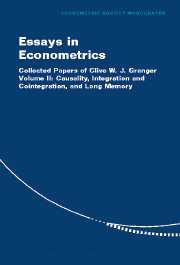Book contents
- Frontmatter
- Contents
- Acknowledgments
- List of Contributors
- Introduction
- PART ONE CAUSALITY
- PART TWO INTEGRATION AND COINTEGRATION
- PART THREE LONG MEMORY
- 17 An Introduction to Long-Memory Time Series Models and Fractional Differencing
- 18 Long Memory Relationships and the Aggregation of Dynamic Models
- 19 A Long Memory Property of Stock Market Returns and a New Model
- Index
17 - An Introduction to Long-Memory Time Series Models and Fractional Differencing
Published online by Cambridge University Press: 06 July 2010
- Frontmatter
- Contents
- Acknowledgments
- List of Contributors
- Introduction
- PART ONE CAUSALITY
- PART TWO INTEGRATION AND COINTEGRATION
- PART THREE LONG MEMORY
- 17 An Introduction to Long-Memory Time Series Models and Fractional Differencing
- 18 Long Memory Relationships and the Aggregation of Dynamic Models
- 19 A Long Memory Property of Stock Market Returns and a New Model
- Index
Summary
Abstract
The idea of fractional differencing is introduced in terms of the infinite filter that corresponds to the expansion of (1 − B)d. When the filter is applied to white noise, a class of time series is generated with distinctive properties, particularly in the very low frequencies and provides potentially useful long-memory forecasting properties. Such models are shown possibly to arise from aggregation of independent components. Generation and estimation of these models are considered and applications on generated and real data presented.
Keywords: Fractional differencing, long-memory, integrated models.
ON DIFFERENCING TIME SERIES
It has become standard practice for time series analysts to consider differencing their series “to achieve stationarity.” By this they mean that one differences to achieve a form of the series that can be identified as an ARMA model. If a series does need differencing to achieve this, it means that strictly the original, undifferenced series has infinite variance. There clearly can be problems when a variable with infinite variance is regressed on another such variable, using least squares techniques, as illustrated by Granger and Newbold (1974). A good recent survey of this topic is by Plosser and Schwert (1978). This has led time series analysts to suggest that econometricians should at least consider differencing their variables when building models. However, econometricians have been somewhat reluctant to accept this advice, believing that they may lose something of importance. Phrases such as differencing “zapping out the low frequency components” are used.
- Type
- Chapter
- Information
- Essays in EconometricsCollected Papers of Clive W. J. Granger, pp. 321 - 337Publisher: Cambridge University PressPrint publication year: 2001



